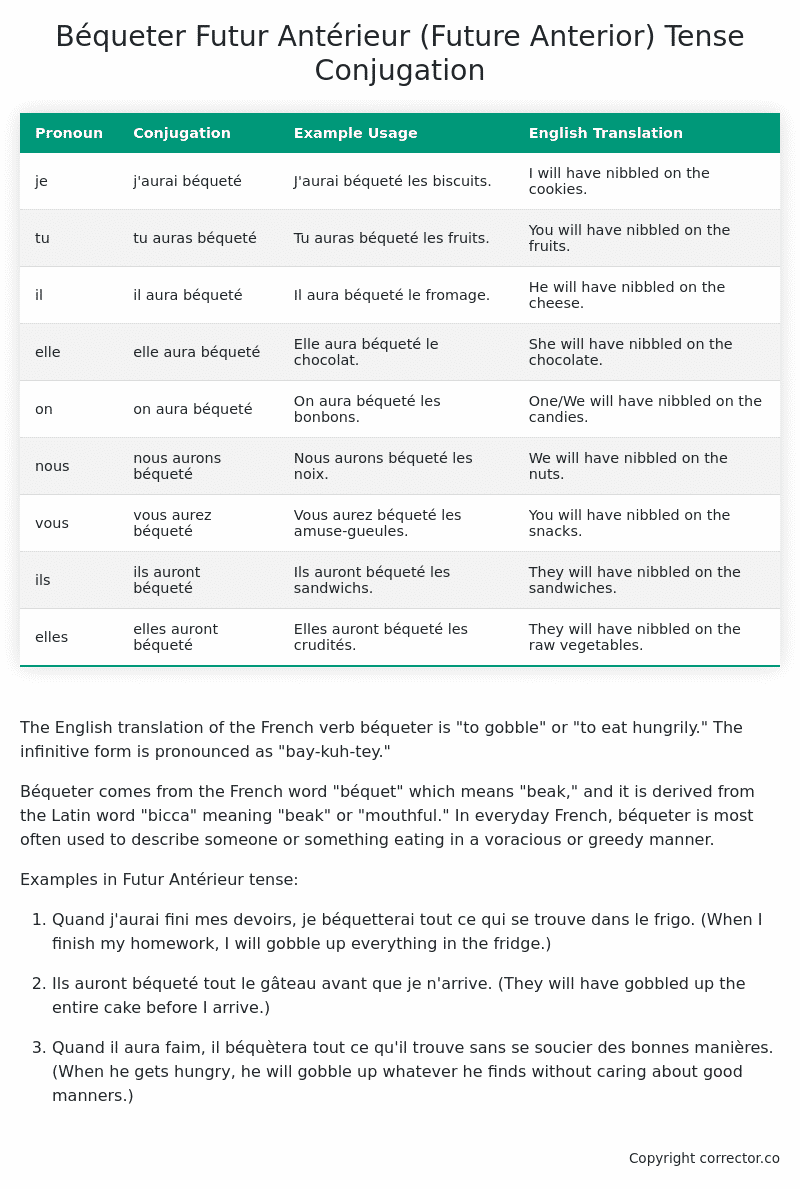Futur Antérieur (Future Anterior) Tense Conjugation of the French Verb béqueter
Introduction to the verb béqueter
The English translation of the French verb béqueter is “to gobble” or “to eat hungrily.” The infinitive form is pronounced as “bay-kuh-tey.”
Béqueter comes from the French word “béquet” which means “beak,” and it is derived from the Latin word “bicca” meaning “beak” or “mouthful.” In everyday French, béqueter is most often used to describe someone or something eating in a voracious or greedy manner.
Examples in Futur Antérieur tense:
-
Quand j’aurai fini mes devoirs, je béquetterai tout ce qui se trouve dans le frigo. (When I finish my homework, I will gobble up everything in the fridge.)
-
Ils auront béqueté tout le gâteau avant que je n’arrive. (They will have gobbled up the entire cake before I arrive.)
-
Quand il aura faim, il béquètera tout ce qu’il trouve sans se soucier des bonnes manières. (When he gets hungry, he will gobble up whatever he finds without caring about good manners.)
Table of the Futur Antérieur (Future Anterior) Tense Conjugation of béqueter
| Pronoun | Conjugation | Example Usage | English Translation |
|---|---|---|---|
| je | j’aurai béqueté | J’aurai béqueté les biscuits. | I will have nibbled on the cookies. |
| tu | tu auras béqueté | Tu auras béqueté les fruits. | You will have nibbled on the fruits. |
| il | il aura béqueté | Il aura béqueté le fromage. | He will have nibbled on the cheese. |
| elle | elle aura béqueté | Elle aura béqueté le chocolat. | She will have nibbled on the chocolate. |
| on | on aura béqueté | On aura béqueté les bonbons. | One/We will have nibbled on the candies. |
| nous | nous aurons béqueté | Nous aurons béqueté les noix. | We will have nibbled on the nuts. |
| vous | vous aurez béqueté | Vous aurez béqueté les amuse-gueules. | You will have nibbled on the snacks. |
| ils | ils auront béqueté | Ils auront béqueté les sandwichs. | They will have nibbled on the sandwiches. |
| elles | elles auront béqueté | Elles auront béqueté les crudités. | They will have nibbled on the raw vegetables. |
Other Conjugations for Béqueter.
Le Present (Present Tense) Conjugation of the French Verb béqueter
Imparfait (Imperfect) Tense Conjugation of the French Verb béqueter
Passé Simple (Simple Past) Tense Conjugation of the French Verb béqueter
Passé Composé (Present Perfect) Tense Conjugation of the French Verb béqueter
Futur Simple (Simple Future) Tense Conjugation of the French Verb béqueter
Futur Proche (Near Future) Tense Conjugation of the French Verb béqueter
Plus-que-parfait (Pluperfect) Tense Conjugation of the French Verb béqueter
Passé Antérieur (Past Anterior) Tense Conjugation of the French Verb béqueter
Futur Antérieur (Future Anterior) Tense Conjugation of the French Verb béqueter (this article)
Subjonctif Présent (Subjunctive Present) Tense Conjugation of the French Verb béqueter
Subjonctif Passé (Subjunctive Past) Tense Conjugation of the French Verb béqueter
Subjonctif Imparfait (Subjunctive Imperfect) Tense Conjugation of the French Verb béqueter
Subjonctif Plus-que-parfait (Subjunctive Pluperfect) Tense Conjugation of the French Verb béqueter
Conditionnel Présent (Conditional Present) Tense Conjugation of the French Verb béqueter
Conditionnel Passé (Conditional Past) Tense Conjugation of the French Verb béqueter
L’impératif Présent (Imperative Present) Tense Conjugation of the French Verb béqueter
L’infinitif Présent (Infinitive Present) Tense Conjugation of the French Verb béqueter
Struggling with French verbs or the language in general? Why not use our free French Grammar Checker – no registration required!
Get a FREE Download Study Sheet of this Conjugation 🔥
Simply right click the image below, click “save image” and get your free reference for the béqueter Futur Antérieur tense conjugation!

Béqueter – About the French Futur Antérieur (Future Anterior) Tense
Construction
Common Everyday Usage Patterns
Interactions with Other Tenses
For example
Summary
I hope you enjoyed this article on the verb béqueter. Still in a learning mood? Check out another TOTALLY random French verb conjugation!


